Supreme Court Consolidates Online Gaming Ban Challenges
Executive Summary
The Supreme Court of India has transferred all pending High Court petitions challenging the Promotion and Regulation of Online Gaming Act, 2025 to itself, setting the stage for a unified constitutional review of the country’s most comprehensive gaming legislation. On September 8, 2025, a bench comprising Justices J.B. Pardiwala and K.V. Viswanathan consolidated cases from Karnataka, Delhi, and Madhya Pradesh High Courts, ensuring a definitive ruling on the law’s constitutional validity. This landmark case will determine the future of India’s ₹23,440 crore online gaming industry and affect millions of users while addressing critical concerns about addiction, money laundering, and constitutional rights.
Unprecedented Judicial Consolidation
The Supreme Court’s decision to transfer all High Court petitions challenging the online gaming ban represents a strategic legal consolidation aimed at ensuring uniform interpretation of constitutional questions. The Centre, represented by Solicitor General Tushar Mehta, successfully argued that multiple proceedings across different High Courts risked creating conflicting rulings on identical legal issues.
The consolidated cases include petitions filed by major gaming companies:
- Head Digital Works (operator of A23 platform) – Karnataka High Court
- Bagheera Carrom (OPC) Pvt Ltd – Delhi High Court
- Clubboom11 Sports & Entertainment – Madhya Pradesh High Court
The Legal Framework Under Challenge
The Promotion and Regulation of Online Gaming Act, 2025, passed with unprecedented speed in August 2025, imposes a blanket ban on all “online money games”. The legislation defines these as any online game where users pay fees, deposit money, or play for stakes with expectations of monetary winnings, regardless of whether the game involves skill or chance.
Key provisions establishing criminal penalties:
- Platform operators: Up to 3 years imprisonment and fines up to ₹1 crore
- Advertisers and promoters: Up to 2 years imprisonment and fines up to ₹50 lakh
- Financial facilitators: Up to 3 years imprisonment and fines up to ₹1 crore
- Repeat offenders: Mandatory minimum 3 years imprisonment and ₹1 crore fine
Fundamental Rights Violations
The legal challenges center on multiple constitutional grounds that could reshape India’s approach to digital platform regulation:
Article 19(1)(g) – Right to Trade and Business: Petitioners argue the blanket ban violates the fundamental right to practice any trade or profession, particularly since games of skill have been consistently recognized as legitimate business activities by courts.
Article 14 – Right to Equality: The Act is challenged as “manifestly arbitrary” for treating legitimate domestic operators equally with illegal offshore betting platforms, and for ignoring the established legal distinction between games of skill and chance.
Article 19(1)(a) – Freedom of Expression: The comprehensive advertising ban is contested as an infringement on free speech rights.
Article 21 – Right to Livelihood: The sudden prohibition directly impacts the livelihoods of over 200,000 industry employees.
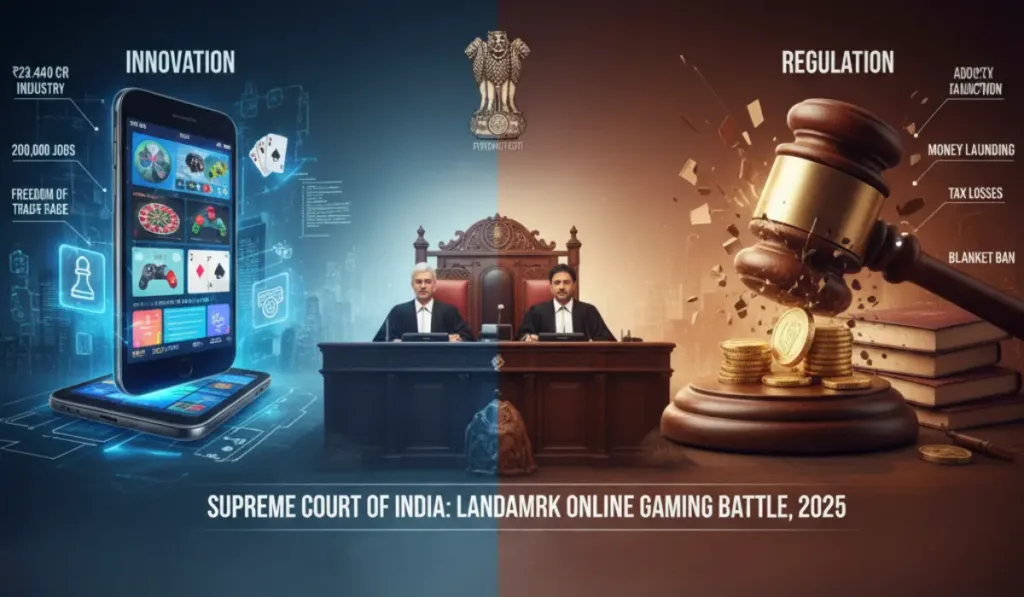
Industry Disruption and Economic Consequences
The online gaming sector, valued at ₹23,440 crore in 2023 and projected to reach ₹70,000 crore by 2027, faces complete restructuring. Real-money gaming contributed 83% of industry revenues in FY23, making the ban’s economic impact substantial.
Critical economic impacts:
- Direct employment: Over 200,000 jobs at immediate risk
- Tax contributions: ₹6,500-6,800 crore in direct taxes annually
- GST collections: Approximately ₹75,000 crore in indirect taxes
- Company-specific losses: Head Digital Works alone paid ₹687 crore in GST in FY 2024-25
Money Laundering and Financial Crimes: The Hidden Crisis
Government investigations have uncovered extensive financial crimes within the gaming ecosystem:
Financial crime statistics:
- Illegal betting market: ₹8.3 lakh crore industry growing at 30% annually
- Tax losses: ₹27,000 crore in annual tax revenue losses
- International operations: Over 600 platforms operating from abroad involved in GST theft
- Major scandals: Mahadev Betting App (₹6,000 crore suspected proceeds), Fiewin (₹400 crore fraud)
Enforcement actions taken:
- Website blocking: 357 illegal offshore platforms blocked by DGGI
- Account freezes: Nearly 2,400 bank accounts blocked, ₹126 crore frozen
- Asset seizures: ₹3.88 billion seized in Mahadev case investigations
- ED crackdown: Nationwide action against companies allegedly siphoning $480 million
Impact on Legal Profession and Practitioners
Precedential Significance
This case will establish critical precedents for:
- Constitutional law: Federal-state jurisdiction boundaries in digital age
- Gaming law: Skill vs. chance distinction in online environments
- Digital regulation: Government authority over technology platforms
- Consumer protection: Balance between innovation and user safety
- Criminal law: Application of traditional offenses to digital activities
Conclusion: A Defining Moment for Digital India
The Supreme Court’s consolidation of online gaming ban challenges represents more than a regulatory dispute—it embodies the fundamental tension between innovation and regulation in India’s digital transformation. The outcome will establish precedents that extend far beyond gaming to encompass broader questions of constitutional rights, federal authority, and government regulation of digital platforms.
As India continues its journey toward becoming a leading digital economy, the Supreme Court’s decision will serve as a crucial reference point for balancing innovation, consumer protection, and constitutional rights in the digital age. The consolidation ensures that this critical determination receives the comprehensive judicial review it deserves, ultimately shaping the regulatory landscape for digital India’s future.
The legal profession must prepare for a ruling that will influence constitutional interpretation, regulatory frameworks, and industry development for years to come. This case represents not just the future of gaming, but a fundamental test of how India’s constitutional framework adapts to the challenges and opportunities of the digital revolution.


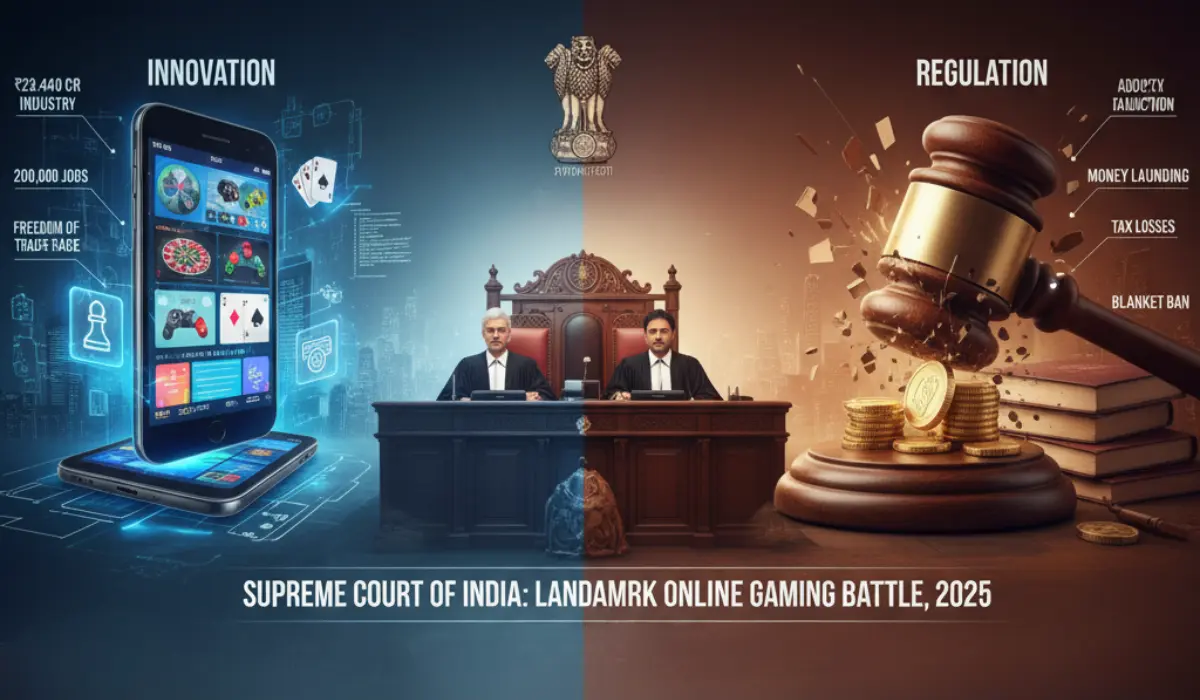
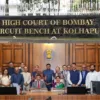
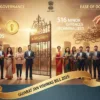
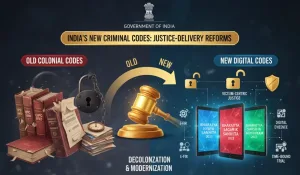
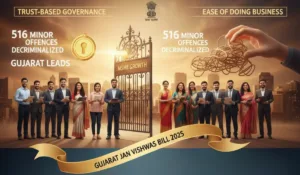
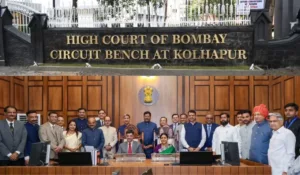
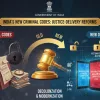
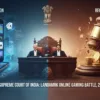
Add comment